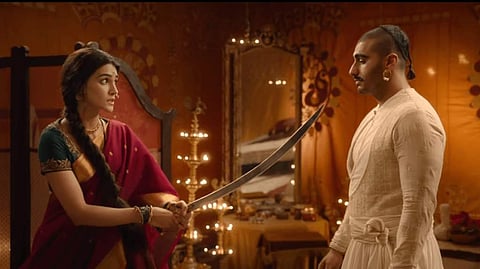Panipat Review: A somewhat inclusive war film, let down by Arjun Kapoor
Rating:(2.5 / 5)
At a crucial juncture in Panipat, Ahmad Shah Abdali, the historical victor of The Third Battle of Panipat, is stunned clueless. Several of his soldiers have been fleeing the battlefield and taking off in random directions. The valiant Marathas, though outnumbered, have somehow managed to scare the Afghans. Perplexed, Abdali sets off on his horse and starts beheading his own men. “If anyone of you runs off from here,” he bellows like an angry sports instructor, “I’ll personally chase you down and kill you.” The desperation in his voice sounds deliberate.
Cast: Arjun Kapoor, Kriti Sanon, Sanjay Dutt
Director: Ashutosh Gowarikar
This scene, among several others, is how director Ashutosh Gowarikar attempts to glorify a lost battle — by playing up the nervousness of the enemies, and by painting the heroes in a glowing light. A similar approach was taken in Kesari, about 21 Sikh soldiers who fought thousands of Afghans. Historical accuracy was barely a concern in the Akshay Kumar movie, while Panipat keeps awkwardly trading off between fact and fiction. The film is strikingly accurate in parts — the use of Zamburaks, or camel-mounted artillery, for instance — and painfully contrived at others (Abdali’s retreat being equated with a fortification of India when in reality it paved the way for the British).
Set in 1761, it follows the northward Maratha expedition to stop the Afghans. Sadashiv Rao Bhau (Arjun Kapoor) leads an army of 40,000 soldiers, along with pilgrims and non-combatants, from Pune to Delhi. He is accompanied by his wife Parvati Bai (Kriti Sanon), his cousin Shamsher Bahadur, and the future Peshwa Vishwasrao. On the other end, Mughal serviceman Najib ad-Dawlah has defected to Abdali (Sanjay Dutt), plunging Delhi into chaos. The bubbling politics makes way for an epic battle, featuring masked elephants and intriguing war formations, but also terrible acting and a stilted pace, with a sluggish male lead who makes it hard to distinguish between flesh and armour.
Undoubtedly, the most fascinating aspect of this story is the journey. How exactly did the Marathas, with limited supplies and a sketchy route plan, brave such an arduous trek across North India? The film doesn’t do much to solve this mystery. We see cavalries pushing across a snaky terrain, tents being set up and dismounted, and that’s about it. There’s a mention of depleting ration — followed by a quick solution. Sadashiv, tasked with bringing down a mammoth enemy, forges important alliances along the way. He combines Jats, Marathas, and Muslims into a consolidated army. These negotiations, though central to the film’s theme, are handled superficially: a string of pot-bellied kings nodding enthusiastically or looking down.
Even in this muscular world, women have a voice. The film is narrated by Parvati Bai, who declares ‘stillness’ and ‘patience’ as the greatest tools of diplomacy. In a cameo, Zeenat Aman appears as Sakina Begum — and reiterates similar views on war. The pacifist tone of these scenes exposes Gowarikar’s tricky position. He’s a bit too desperate to play into patriot season but lacks the rampant bloodlust to go all the way. Although he is readily identified as a looter, Abdali’s reasons to invade India are merely strategic, unlike the rapist Khilji in Padmaavat.
Before the action begins, Panipat lolls about in the domestic politics of the Peshwa household. Mohnish Behl, his eyes red with paternal rage, is a delight as Nana Saheb Peshwa. The past doesn’t quite catch up with Arjun, who is more withdrawn and unenergetic than his contemporary roles. Kriti does better on the battlefield than the saas-bahu interludes in the beginning, enduring catty remarks from Gopika Bai (Padmini Kolhapure). “These Indians have a problem,” Abdali grunts near the end. “They keep fighting amongst themselves.” He is not just talking about our states, but also about our homes.

